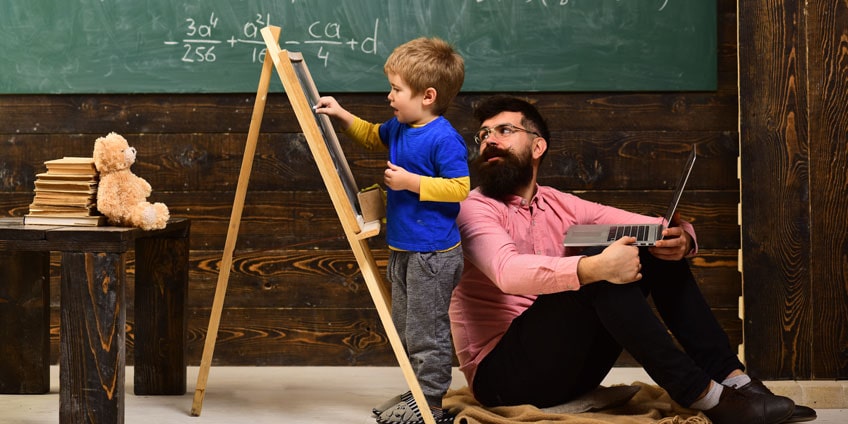Home education is a trend that is becoming more and more popular nowadays. Parents think that contemporary primary and secondary schools do not quite correlate with the needs of their children, and that educational programs do not represent the current world’s demands and progress. There are many other arguments used by home education supporters, and we are going to discuss them in this article.
Education at Home: Pros and Cons
Check the essay writing UK expert’s opinion. Home education: is it good or bad for children?

Contra Argument: Lack of Child’s Socialization
The first argument of home education opponents concerns the lack of opportunities for children to socialize. Nowadays, a child develops socialization skills at school: megalopolis inhabitants are not likely to allow their children walk around with no escort and control.
At the same time (maybe, even due to this fact) the entertainment industry for children is booming. The lack of socialization can be partly neutralized by attending different clubs, and regular time spent on equipped playgrounds for children.
Nevertheless, a comfortable family environment or even a sports club is really not enough for a child to gain important social skills.
By removing a child from the “crowd” and organizing the individual home education space for it, parents take a certain risk too. For instance, children studying at home are much more likely to fear making a public speech or engaging in any performance. If parents decide to educate a child at home, they need to fill the gaps in their communication skills’ development. They need to ensure regular interactions with the outside world.
Additionally, a child may fail to gain important skills of defending their opinion to other kids and adults.
It is important not only to solve the question of a child’s general education by encouraging them to visit different clubs and creativity classes at children’s centers. At least one of home education resources for additional skills should be about teamwork and working with others.
Pro Argument: Education at Home Means Psychological Comfort
On the other side of the forced socialization, there is the psychological comfort of a child: no unnecessary pressure, no conflicts with teachers, classmates or elder schoolmates. Conflicts that go unresolved, fighting, and bullying affect children in traditional schooling environments.
One of the main achievements of home education is the elimination of these common psychological torments. The whole educational process is instead built around the personal life rhythm of each child. One child may feel fine to study in the morning, others are better remembering new things in the evening. Both approaches are possible in home schooling.
The correct distribution of workload makes it easier for children to master the material and increases their motivation for learning. The possibility to pass exams on a flexible basis helps shape the home education process in a totally comfortable way. The availability of free time allows parents to concentrate on their child’s hobbies and interests. Moreover, it means more time spent with family and friends.

Contra Argument: Home Education Resources Don’t Support One’s Self-Discipline
This is another widespread question for worrying parents considering a switch to home education: isn’t their child likely to “skip” studying while being absolved of precise schedule and obligatory class visits since there is so much free time?
The main principle of home education is about following the child and their interests. The definition of a school year becomes individual: the learning process can be either prolonged or shortened when the kid completes the educational plan earlier than expected.
Still, the control from parents is necessary. Additionally, everyday cooperation and education organized by parents play a very serious role in the process. An adult is to be a team player and a supporter who demonstrates the will to teach and help the child. This attitude will enable parents to track the home education progress.
In case of home education, “group classes” do not mean parents helping kids prepare their homework. They are more likely to be labeled as mentorship. It’s possible to enable the learning process everywhere: while walking around the park or forest, watching educational movies or fictional films about a certain historical period, preparing theatrical and singing performances, making creative drawings, camping and running.
A child studying at home can feel better, sleep better and devote as much time to their lessons as necessary: from a single hour per day to a usual school day with multiple hours of lessons. On the other side, home education is something that puts serious constraints on parents and their freedom, as at least one of them will have to spend all their time preparing interesting learning programs, excursions and other educational events.
When discussing pros and cons of home education, people often espouse the freedom to learn at one’s own pace to be the main advantage of this method. The parents and the child can choose what to learn, when to learn and for how long. This begs the question: what is the basis for the child’s choice? The child’s personality, interests and values have not been completely shaped yet and are malleable. They need to develop based on the limits set by adults, including teachers in school.
Another component which is critical to take into account when discussing education is motivation. Unfortunately, it is not always stable for children.
Still, a child who sleeps well and has the opportunity to gain new knowledge in a comfortable and not forced pace is more likely to want to continue learning. This is especially true compared to a child who is only free of school work during a vacation and does not even want to hear about reading books or attending additional classes in that time frame.
Education at Home and Family Connections
First of all, home is a place of comfort, calmness and joy. It is often times much easier to create conditions for maximum concentration levels in a place where a child feels relaxed and comfortable. The learning environment is a key aspect here, as it reveals additional possibilities for self-development and determining one’s interests. This can be nearly anything. Encyclopedias, books, creativity sets, musical instruments, sports gear, construction sets, and environmental learning equipment (microscopes, binoculars, telescopes, etc.) are all things that encourage a child to try different activities.
Of course, no parent is able to equally replace 12-15 professional teachers, but every loving mother is able to go in for in-depth learning using their child’s psychology. Children are easy to teach when they see a sincere interest of adults. Creative approaches and joint efforts of dealing with a certain case make the child want to continue mastering complicated materials. In this way, an adult can compensate their lack of knowledge on the subject or pedagogical education. Tutors or educational clubs are a way to help kids deal with the subjects that cause the most difficulties.
According to Dr. Brian D. Ray, Canadian parents think that a child can understand family traditions better and live a fuller life when they do not have to go to school.
Still, it is important to realize that every person has to learn how to behave in a society sooner or later. And it is easier to master this skill when you’re young. At the moment, your child might be comfortable enough communicating with parents and close relatives, but they are going to need more attention from non-family members. Additionally, there exists a problem of society not accepting the child’s educational background as legitimate when they did not go to a traditional school.
Point to Consider: Home Education Quality
At schools, classes are organized according to the precise instructions, plans and demands, while at home parents and their kids are free to use any source of information they find useful and study interesting subjects deeper at their own pace. Experts like Brian D. Ray, mentioned previously, think that this has a positive impact on the quality of education.
Most primary and secondary schools are oriented towards the average student. A “strong” child has nothing to learn there, while a “weak” one can’t keep up even with the “average” students.
Many aspects depend on teachers and professors as well. Parents complain that teachers give only the basic knowledge of the subject, and the rest of materials children have to master at home with their parents.
In this situation, a question for parents appears: is it worth to attend school classes at all? Maybe, it’s better to “switch” to home education.
Children who were educated at home not due to forced circumstances or health problems can usually compete with their peers on equal terms. Back in 2012, Doctor Ray stated that all the existing research revealed the same conclusion: home education results are at least not worse (frequently they are even better) than those of traditional education’s methods both in terms of the academic and social lives.
Ray remarks that the principle “The point is not to memorize the information, but to know where to find it” is relevant for home education. Nowadays, it is possible to find a specialist ready to share knowledge on any question. Free education stimulates children to look for the information and to study deeper.

To Conclude
Home education is not a magic pill. It can’t be perfect for all children. There are children who have an exceptionally high need for tight connections with the team of like-minded kids. The home environment is not able to satisfy this need. So, the answer for the question if home education is “worth it” is individual for every child.
